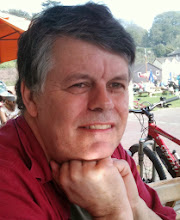I usually glance at The New York Times supplement that arrives along with each week's Observer and rarely does anything catch my eye. But I'm glad that I did yesterday as there was a fabulous essay by Dwight Garner entitled Meaning of Silence in a Noisy World. He mentions three book which make interesting reading alongsidew my favourite covering the subject: Sara Maitland's A Book of Silence [Granta] which has the subtitle A journey in search of the pleasurs and power of silence.
Googling it to try and link to it proved difficult, so here's the eassy in full
Meaning of Silence In a Noisy World
There is dignity in quiet things and quiet people, and gravity accrues to those activities we mostly perform in silence: reading, praying, looking at paintings, standing in the woods.
We equate loud noise with violence. Without loudspeakers, Hitler observed, the Nazis never would have conquered Germany. It’s hard to imagine Gandhi astride a Harley.
We’d like to think, most of us, that we are essentially quiet; that is, considerate of our fellow human beings without being mousy and limp and uninteresting. But let’s not rush to congratulate ourselves. We should be wary of drawing easy “moral analogies between noise and evil, quiet and good,” Garret Keizer writes in his shrewd new book, The Unwanted Sound of Everything We Want: A Book About Noise [Public Affairs]. After all, Adolf Eichmann and the serial killer Ted Bundy were quiet types, too.
The cost of our silent moments is usually clamor in someone else’s ear. Trees are cut, paper pulped and printers run to make books and newspapers. To flick on a light is to add buzz, down the line, to the grid. To attend a meditation retreat, there’s a plane to catch. One person’s om is another’s ka-boom.
Our world is getting louder, a bone-crunching and I.Q.- lowering fact that is explored, in an uncanny convergence, in not one but THREE new books - Mr. Keizer’s as well as
Zero Decibels: The Quest for Absolute Silence [Scribner], by George Michelsen Foy; and In Pursuit of Silence: Listening for Meaning in a World of Noise [Doubleday], by George Prochnik.
More planes crisscross the sky, and more cars hiss by on more roads, these writers observe. More BlackBerrys chirp. Coffee grinders and espresso machines scramble, in cafes, what’s left of our wits. We blot all this out with what may be the most damaging sound of all, the din that pulses from iPod ear buds.
I read all these books with an awareness of why my own nerves are increasingly jangled, why I mostly write (and often read) while wearing a clunky set of ear protectors, of the sort a particularly unhip airport runway worker in 1961 might have had clasped to his head. Make the world go away, as Hank Cochran’s song put it. Let my kids snicker at me.
If these books deepened my awareness of noise, however, they also complicated it. As the effortlessly intelligent Mr. Keizer points out, noise is among the thorniest class issues of our time, and we tend to utterly ignore its meanings.
You can judge a person’s clout - his or her social and political standing - by witnessing how much racket he or she must regularly endure. Those who lack silence in their lives tend to be the politically weak, whether the poor (investment bankers don’t live near runways) or laborers or soldiers or prisoners or children. In creating noise that others must live with, we display our contempt for those weaker than ourselves. Hear us roar; eat our exhaust.
There’s no doubt how harmful this clatter is. Repeated studies show it leads not just to hearing loss but also to heart disease, high blood pressure, low birth weight and reduced life span. We crossed the line, many kilometers back, that divides having a blast from simply being blasted.
As I read these three books, the noises around me separated and became achingly distinct, both the great ones - my kids, the dogs and chickens, my wife going about her day - and those that knock me senseless: the pounding of a nearby construction crew, the motorcycles that sometimes race down my dirt road, low-flying helicopters . True listening is like spinning a radio dial: it’s part static, part bliss.
Reading these books, too, I was reminded, without going anywhere, of that phenomenon that occurs when you’re driving and find yourself lost. To reorient yourself, you snap off the stereo. You find a way to become as silent as you can.
The REAL Financial Crisis
16 years ago

No comments:
Post a Comment